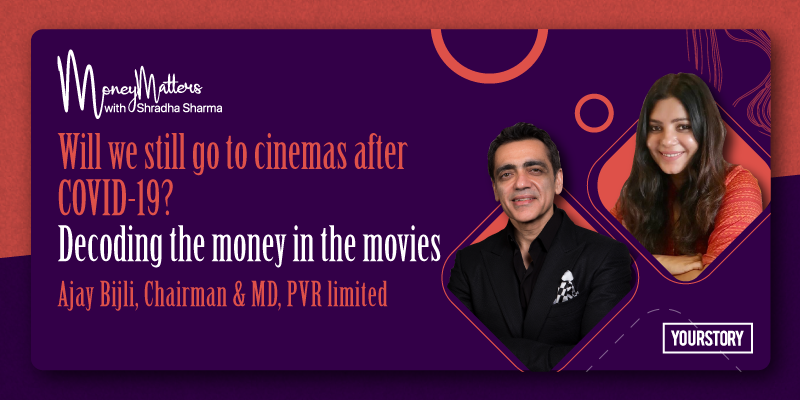Why Ajay Bijli of PVR believes theatres will overcome the worst of times, including coronavirus
On Money Matters with Shradha Sharma, Ajay Bijli, Chairman and MD of PVR, decodes the effect of coronavirus on the traditional entertainment industry.
The coronavirus pandemic has sounded alarms across industries, slowing the economy, grounding operations, cutting jobs, and throwing business projections out of the window. The lockdown has hurt companies in ways unprecedented and unforeseen.
Outdoor entertainment, which requires people to gather in large numbers, has naturally been one of the worst-hit sectors. This includes the film exhibition business, which has come to a standstill after the closure of movie theatres and multiplexes. Releases have halted, cineplexes have been sealed, and viewers are homebound.
What does this mean for businesses operating in this space? What does a revival entail? What measures can multiplexes take to offset the disruption caused by the pandemic? And, most importantly, how will COVID-19 impact cine-goer behaviour?
PVR Founder, Chairman, and MD Ajay Bijli joined Founder and CEO Shradha Sharma in the ninth episode of Money Matters to discuss all this and more.
Watch the full episode here:
At the very outset, Bijli shared that despite the extraordinarily challenging times the movie business is facing right now, he believes that things will return to normal without making much of a dent in consumer behaviour.
He elaborates, “Our business operates in confined spaces. So, we were the first ones to be told to close down and will probably be the last ones to open (along with food courts and malls). But I am banking on the fact that going out is innate human nature, and 10 weeks of lockdown cannot change that. All of us are so restless to go out now.”
Bijli believes that humans are “designed and created to go out”.
And, with almost 70 percent of PVR audiences belonging to the 12-to-34 age bracket, theatrical businesses will bounce back without a doubt.
“These youngsters are resilient and restless, and they want to go out. If the safety, security, and sanitisation of theatres are taken care of, people will come back to the big screen,” he told Money Matters.
Battling a lockdown, staying relevant
PVR, one of India’s oldest and largest film exhibitors, operates in close to 78 cities and reaches 110 million viewers. About 20 million of these are loyalty card members, who are being offered PVR gift cards at discounted prices.
These cards are valid for a few months and can be redeemed when business resumes.
Explaining the strategy, Bijli said, “Every company today is thinking about what they can do in a lockdown. We came up with the idea of gift cards just to keep the brand moving so that PVR doesn’t become out of sight and out of mind.”
Besides coming up with ways to keep the audience engaged, PVR — like most other businesses — has also had to resort to some cost-cutting measures.

Its 15,000-strong workforce includes housekeeping and security personnel, who are employed at the theatre complexes. Due to the complete shutdown across the country, it has been compelled to rescind some of those contracts.
Bijli says, “As a businessman, you can forecast volatility, but you can never forecast a zero-revenue situation. We have shut all our theatres in a staggered manner since March 11, and there is no cash flow after that.”
PVR is also negotiating its rental payments with mall developers and real estate owners. Bijli is confident that PVR’s goodwill and strong “stakeholder” relationships will ensure that it gets some relief on that front. “The industry is also hoping for some government relief once the theatres open around July 1,” he said.
On being asked if PVR intends to diversify into other areas given the stoppage of its current business, Bijli said, “I have always believed in core competencies… that you do one thing, and do it very well. I have been fascinated by people like Michael Jordan and Sachin Tendulkar who excelled at their core competency. Even companies like Starbucks, McDonald’s, and others which do one thing very well.”
“What we didn’t realise is that when you do one thing and not have a diversified portfolio, what happens when that one thing gets impacted? We want to steady the ship and continue to do our core. If we get into adjacent businesses, it will only be those that can augment and enhance the core, and not disrupt it,” he added.
Will OTTs trump theatres post COVID-19?
No one knows how cinegoers are likely to behave after the coronavirus retreats. Will they choose indoor options like online streaming (OTT) over physical theatres?
Purists, including filmmakers and audiences, have always believed that nothing could possibly match up to the experience of watching a movie on the 70mm screen.
PVR’s Bijli concurs. “Longform storytelling like TV series will continue to grow on OTT platforms, but short-form storytelling like a quick movie will always bring people back to the theatres. It is an experience they want,” he says.
Bijli mentions how 40,000 screens in the US are gearing up for the release of Christopher Nolan’s Tenet. The director has gone on record to say that no matter what happens to the world, his action thriller will hit the big screen on July 17, 2020.
He also cites surveys conducted among cinegoers in the UK and China, where 75 percent to 80 percent of people said they would go out for a movie.
Bijli observes, “Audiences want brand new content. Old movie reruns in China didn’t work. But South Korea, which has a robust local film industry, did good business after reopening its theatres. The Indian film industry is relentless in creating content. Over 1,500 films pass through the system and 1.5 billion movie tickets are sold annually.”
OTTs are enjoying their time in the sun, no doubt. But theatricals, which account for two-thirds of a film’s monetisation, will continue to dominate, according to Bijli.
“But what COVID-19 will do is make people look at their long-term plans and question their business models. The challenges cannot bog you down… you have to take them head on. That is the true test of being at the helm of affairs,” he says.
Edited by Saheli Sen Gupta













